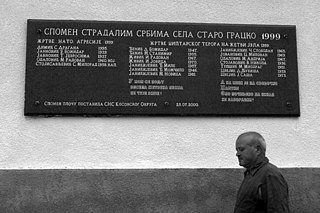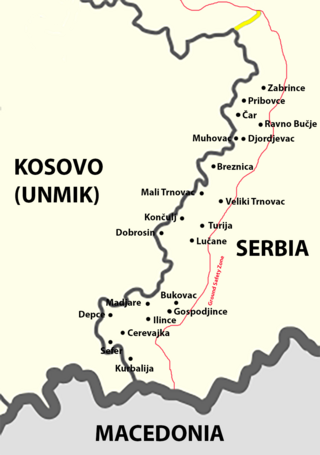
The Kosovo War, was an armed conflict in Kosovo that lasted from 28 February 1998 until 11 June 1999. It was fought between the forces of the Federal Republic of Yugoslavia, which controlled Kosovo before the war, and the Kosovo Albanian separatist militia known as the Kosovo Liberation Army (KLA). The conflict ended when the North Atlantic Treaty Organization (NATO) intervened by beginning air strikes in March 1999 which resulted in Yugoslav forces withdrawing from Kosovo.

The Kosovo Liberation Army was an ethnic Albanian separatist militia that sought the separation of Kosovo, the vast majority of which is inhabited by Albanians, from the Federal Republic of Yugoslavia (FRY) and Serbia during the 1990s. Albanian nationalism was a central tenet of the KLA and many in its ranks supported the creation of a Greater Albania, which would encompass all Albanians in the Balkans, stressing Albanian culture, ethnicity and nation.

The Liberation Army of Preševo, Medveđa and Bujanovac was an Albanian militant insurgent group fighting for separation from the Federal Republic of Yugoslavia for three municipalities: Preševo, Medveđa, and Bujanovac, home to most of the Albanians in south Serbia, adjacent to Kosovo. Of the three municipalities, two have an ethnic Albanian majority, whilst Medveđa has a significant minority of them.

The National Liberation Army, also known as the Macedonian UÇK was an ethnic Albanian militant and separatist militia that operated in the Republic of Macedonia in 2001 and was closely associated with the Kosovo Liberation Army (KLA). Following the 2001 insurgency in Macedonia, it was disarmed through the Ohrid Framework Agreement, which gave greater rights and autonomy to the state's Macedonian Albanians.
The Račak massacre or Račak operation was the massacre of 45 Kosovo Albanians that took place in the village of Račak in central Kosovo in January 1999. The massacre was perpetrated by Serbian security forces in response to Albanian separatist activity in the region. The Serbian government refused to let a war crimes prosecutor visit the site, and maintained that the casualties were all members of the rebel Kosovo Liberation Army (KLA) killed in combat with state security forces.

The North Atlantic Treaty Organization (NATO) carried out an aerial bombing campaign against the Federal Republic of Yugoslavia during the Kosovo War. The air strikes lasted from 24 March 1999 to 10 June 1999. The bombings continued until an agreement was reached that led to the withdrawal of the Yugoslav Army from Kosovo, and the establishment of the United Nations Interim Administration Mission in Kosovo, a UN peacekeeping mission in Kosovo. The official NATO operation code name was Operation Allied Force whereas the United States called it Operation Noble Anvil ; in Yugoslavia the operation was incorrectly called Merciful Angel, possibly as a result of a misunderstanding or mistranslation.

The Yugoslav Wars were a series of separate but related ethnic conflicts, wars of independence, and insurgencies that took place in the SFR Yugoslavia from 1991 to 2001. The conflicts both led up to and resulted from the breakup of Yugoslavia, which began in mid-1991, into six independent countries matching the six entities known as republics that had previously constituted Yugoslavia: Slovenia, Croatia, Bosnia and Herzegovina, Montenegro, Serbia, and Macedonia. SFR Yugoslavia's constituent republics declared independence due to unresolved tensions between ethnic minorities in the new countries, which fuelled the wars. While most of the conflicts ended through peace accords that involved full international recognition of new states, they resulted in a massive number of deaths as well as severe economic damage to the region.

Operation Horseshoe was a 1999 alleged plan to ethnically cleanse Albanians in Kosovo. The plan was to be carried out by Serbian police and the Yugoslav army.

The Republic of Kosova, also known as the First Republic of Kosovo, was a self-declared proto-state in Southeast Europe established in 1991. During its peak, it tried to establish its own parallel political institutions in opposition to the institutions of the Autonomous Province of Kosovo and Metohija held by Yugoslavia's Republic of Serbia.
The Podujevo bus bombing was an attack on a bus carrying Serb civilians near the town of Podujevo in Kosovo on 16 February 2001. The bombing killed twelve Serb civilians who were travelling to Gračanica and injured dozens more. Albanian extremists are suspected of being responsible for the attack. Gračanica is a predominantly Serb-populated town in central Kosovo, near the regional capital Pristina, in a predominantly Albanian-populated area. Following the Kosovo War in 1999 it became an enclave within Albanian-controlled territory. Relations between the two communities were tense and occasionally violent.

The Insurgency in the Preševo Valley was an approximately two year-long armed conflict between 1999 and 2001, between the Federal Republic of Yugoslavia and the ethnic Albanian separatists of the Liberation Army of Preševo, Medveđa and Bujanovac (UÇPMB). There were instances during the conflict in which the Yugoslav government requested KFOR support in suppressing UÇPMB attacks since they could only use lightly armed military forces as part of the Kumanovo Treaty that ended the Kosovo War, which created a buffer zone between FR Yugoslavia and Kosovo.

The flag of the Republic of Kosovo was adopted by the Assembly of the Republic of Kosovo immediately following the unilateral declaration of independence of Kosovo on 17 February 2008. The flag design emerged from an international competition, organized by an informal group from the Provisional Institutions of Self-Government known as the Kosovo Unity Team, which attracted almost one thousand entries. The winning design was proposed by Muhamer Ibrahimi. It shows six white stars in an arc above a golden map of Kosovo, all on a blue field. The stars symbolize Kosovo's six major ethnic groups: Albanians, Serbs, Bosniaks, Turks, Romani, and Gorani.

Finland–Kosovo relations are foreign relations between Finland and Kosovo. Kosovo declared its independence from Serbia on 17 February 2008 and Finland recognised it on 7 March 2008. Finland maintains an embassy in Pristina.

Relations between Albania and Serbia have been complex and largely unfriendly due to a number of historical and political events.

The OSCE Kosovo Verification Mission (KVM) was an OSCE mission to verify that the Serbian and Yugoslav forces were complying with the UNSC Resolution 1203 and the Clark-Naumann agreement, to end atrocities in Kosovo, withdraw armed forces from Kosovo, and abide by a ceasefire. The mission was deployed on 25 October 1998, withdrawn in March 1999 and was closed on 9 June 1999.

The Staro Gracko massacre was the mass killing of 14 Kosovo Serb farmers in the village of Staro Gracko in the Kosovo municipality of Lipjan on 23 July 1999. The killings occurred after Yugoslav troops withdrew from the region in the aftermath of the Kosovo War. The massacre is the worst single crime in Kosovo since the conflict ended in June 1999. As of 2019 the perpetrators of the killings have never been found and held accountable.

The Insurgency in Kosovo began in 1995, following the Dayton Agreement that ended the Bosnian War. In 1996, the Kosovo Liberation Army (KLA) began attacking Serbian governmental buildings and police stations. This insurgency would lead to the more intense Kosovo War in February 1998.
This article includes information on actions described as terrorist acts in the Federal Republic of Yugoslavia, Serbia and Montenegro (2003–2006) and Serbia.

The Ground Safety Zone was a 5-kilometre-wide demilitarized zone (DMZ) established in June 1999 after the signing of the Kumanovo agreement which ended the Kosovo War. It bordered the area between inner Republic of Serbia in the Federal Republic of Yugoslavia (FRY) and Kosovo.















